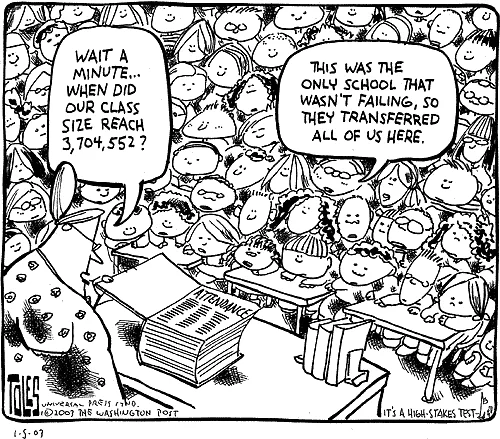CSotD: Fine-Tuning the Hickory Stick
Skip to commentsDanziger tells us what we ought to already know, but “ought to” is critical, because there are way too many people — by which I mean voters — who have no idea how schools work or why we have a Department of Education in the first place.
The notion that Trump/Musk are bringing an end to the federal government telling schools what to teach is ludicrous. There is no federal curriculum. States set their own standards, which is why some of them lag and some of them excel.
Much of what DOE does is to provide information and funding for preschool, remedial and special-ed programs, together with passing on information about best practices, which schools can adopt, adapt or ignore as they wish.
I spent about 30 years teaching media literacy, talking to teachers, students and administrators and writing curricula in a variety of subject areas. That included a lot of lunches, either in the teachers’ lounge or with the kids in the cafeteria. I’ve also covered school board meetings and educational conferences, but the real insights came at those lunches.
I mention this to distinguish my opinions from those of Donald Trump, Elon Musk or other armchair educators, the problem being, as I’ve often said, that no intelligent person thinks eating in a restaurant qualifies them to be chefs, but a whole lot of people think that, because they were students, they understand teaching.
Juxtaposition of the Day
Kelley gets it right that one-third of eighth grade students are reading below the benchmarks, though he uses a cartoonist’s privilege to exaggerate by suggesting that the underperforming third are totally illiterate. Bok, however, treads on reality in ways that seem more hostile than insightful.
The issue of teacher pay confuses a lot of people. The point of increasing pay is only partially to better compensate current teachers. It’s also to attract more applicants to the profession, which would improve things. That’s true of most professions, of course.
The problem with teacher pay or any spending in education is that, in most places, school budgets are the only time people get to vote on specific taxes, which makes them particularly vulnerable to misers. Voting down the school budget because you don’t have kids is like voting down the fire department’s budget because your house isn’t burning.
Test scores are another largely misunderstood matter. One problem with NAEP tests is that testing by grade level assumes that there’s no difference between the Class of 2029 and the Class of 2028. Theoretically, you’ve got a large enough sample that differences should disappear, but if we learned anything from Covid it’s that not every year is the same, even if you believe every class is.
Also, this year’s scores were down from four years ago, but not down a whole lot, and better than in some other years. When you’re talking, for instance, about fourth-grade reading scores dropping five points, it’s from 220 to 215, a difference of less than 2.5%.
The other thing to remember is that we test all our kids and not all countries do. Beware of comparisons between nations. If all the world’s kids were in school, you would have had to pay more for that pair of pants you’re wearing.
Another attack on public education is well under way: The move for “school choice,” which began honorably enough as a chance for students in underperforming schools to transfer.
As Tom Toles pointed out in 2007, this remedy contained the seeds of its own destruction, but it soon spawned charter schools, which were public schools with individual operating systems and alternative curricula.
One flaw in the school-choice concept was that it threatened to take kids of caring, involved parents out of the local schools, leaving failing schools free to fail some more without anyone raising hell with the school board. But another flaw was that, when a district offered choice, they found that parents often chose not by how good a particular school was but by how handy it was to drop off their kids there on the way to work.
What Anderson points out is the further contamination of the concept, a growing trend of states to use educational funding to help parents pay tuition to private schools. As he notes, this approach was introduced as helping more families have choice, but the requirements have become so generous — and not only in Texas — that families that don’t need the help can scoop up the gravy anyway.
In New Hampshire, examining the program showed that a large percentage of families using the funding already had kids in private schools to begin with. And this program takes funding from the public schools.
Do our schools need improvement? Do they need help? You bet they do.
But the biggest change they need is for education to become a priority rather than a pawn.
I don’t think this is the right moment in our nation’s history to expect that.
Elsewhere in the Swamp
There seems to be, as Heller notes, a lot of calls for the Democrats in Congress to Do Something. What I’m not hearing are a lot of specifics about what anybody wants them to do.
There was a bit of stalling to delay votes on cabinet nominees, but the days of the talking filibuster are over and there’s not much the minority party in both houses can do about measures that take only a simple majority.
The problem isn’t that the Democrats aren’t concerned. It’s the Republicans’ lockstep solidarity. At a time when DOJ employees are quitting their jobs rather than dishonoring themselves, Republican legislators are hiding under their desks in fear of being primaried if they vote their consciences instead of Just Following Orders.
Fortunately, a resistance is growing and there has been some valuable pushback, not in Congress but in the courts. We still need to see if Musk/Trump will defy those courts, but mostly we need to see what will happen if they do.
I got a laff from Wallace, remembering how we stamped out one of those on campus 56 years ago, in the flight path of the South Bend airport.

This game ain’t over.









Comments 18
Comments are closed.